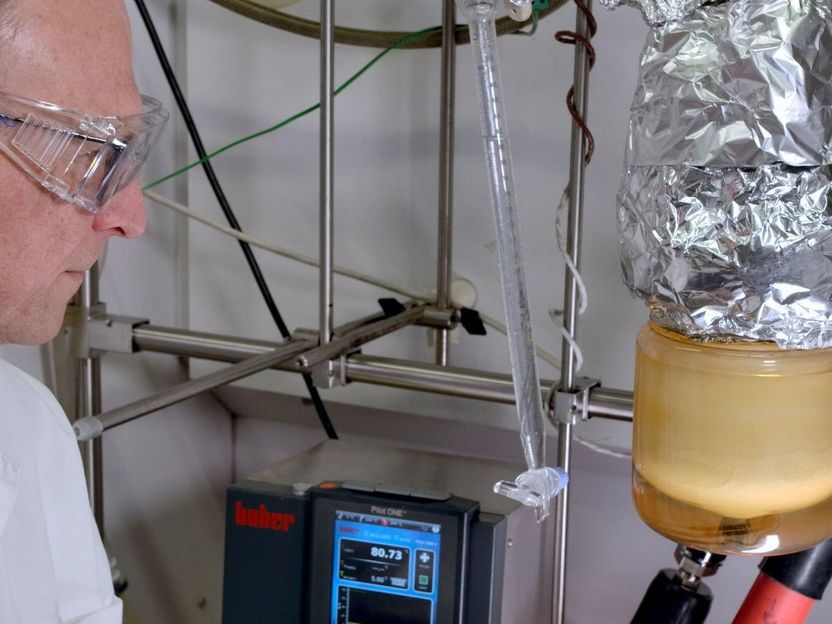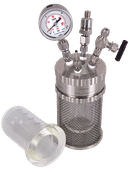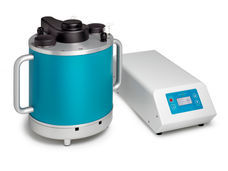A chemical reactor has been invented that can store energy without loss for months
The energy can then be used for heating in winter
Storing Energy over the long term is arguably the biggest unsolved problem of the energy transition. A new type of chemical heat storage system has now been invented at TU Wien (Vienna) that can store large amounts of energy in an environmentally friendly way for a virtually unlimited period of time.

Prof. Franz Winter in the lab
Technische Universität Wien
Heat is used to trigger a chemical reaction. This produces energy-rich chemical compounds that can be stored for months without any loss of energy. When needed, the chemical reaction can be reversed and the energy released again. In this way, waste heat from industrial plants or solar heat can be stored in summer and used to heat buildings in winter. The chemical reaction and the suspension reactor specially developed for it have now been patented.
Using chemistry to store warmth for the winter
There are many ways to store energy, but they all have their drawbacks: Batteries can be charged, but their capacity is limited. Hydrogen can be produced with electricity, but it is difficult to store it for long periods of time. TU Wien’s new method is based on a completely different principle - the conversion of thermal energy into chemical energy – and vice versa.
"There are different chemical reactions that can be used for this purpose. For example, we use boric acid, a solid material, which we mix with oil," says Prof. Franz Winter from the Institute of Chemical, Environmental and Bioscience Engineering at TU Wien. "This oily suspension goes into a reactor whose wall is heated to a temperature between 70°C and 200°C." Many processes in industry occur in this temperature range, so this method is ideally suited to using waste heat from industrial plants that would otherwise simply be lost. But it is also possible to achieve such temperatures simply by concentrating sunlight.
The heat causes a chemical reaction - for example, boric acid is converted into boric oxide, and water is released in the process. The oily boric oxide suspension can then be stored in tanks. If water is added to this suspension, the chemical reaction takes place in reverse and the stored heat is released again.
"This closes the cycle and the suspension can be used again," explains Franz Winter. "In the laboratory, we have shown that many cycles are possible in this way without any problems."
Many advantages
The technology has already been patented, but scientists at TU Wien are still working on optimizing the process. "Different reactor sizes will be optimal for different applications," says Franz Winter. "You always have to see these reactors as part of an overall system. Depending on what quantities of heat are generated at what temperatures in an industrial plant, for example, and what other energy technology facilities already exist there, you have to optimally adapt the process."
Besides boric acid, other chemicals can also be used - hydrated salts have also been investigated. Boric acid and salt hydrates combine several advantages: they are inexpensive and easily available, relatively harmless and stable over many cycles, and they can be stored for any length of time. The reactor technology can be scaled up to industrial standards. The oil used allows optimal heat transfer while protecting the reactor during the reaction and the solids during storage.
It is not possible to pinpoint the exact overall efficiency of the process yet – it depends heavily on how the storage is coupled with other technologies. The great advantage is the long-term storage possibility of heat quantities that would otherwise simply be lost, and their demand-oriented use.
"We now want to continue intensive research on this technology, also together with industrial partners," says Franz Winter. "We are convinced that an important step forward has been achieved with this invention, which will also find its way into industrial application in the next few years."
Most read news
Topics
Organizations
Other news from the department science
These products might interest you

Berghof Reaktortechnologie - Hoch- und Niederdruckreaktoren, Druckbehälter und metallfreie Reaktoren by Berghof
Safe high- and low-pressure systems for aggressive media
Corrosion-resistant reactors with PTFE lining - individually configurable

BUCHI MINICLAVE by C3 Prozess- und Analysentechnik
Flexible small reactor systems - acid resistance, visual control and individual customization options for a wide range of applications!

PhotoSyn™ by Uniqsis
Experience the future of photochemistry
Flow reactor with user-friendly control for higher yields and selectivity

Get the chemical industry in your inbox
By submitting this form you agree that LUMITOS AG will send you the newsletter(s) selected above by email. Your data will not be passed on to third parties. Your data will be stored and processed in accordance with our data protection regulations. LUMITOS may contact you by email for the purpose of advertising or market and opinion surveys. You can revoke your consent at any time without giving reasons to LUMITOS AG, Ernst-Augustin-Str. 2, 12489 Berlin, Germany or by e-mail at revoke@lumitos.com with effect for the future. In addition, each email contains a link to unsubscribe from the corresponding newsletter.


























































